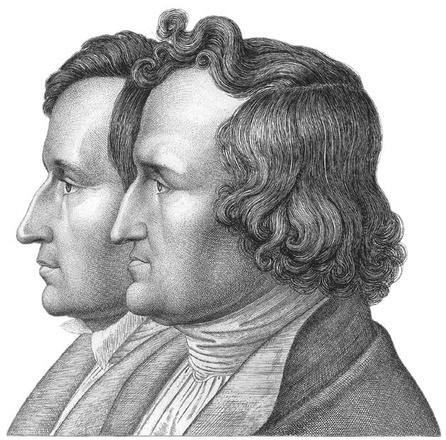|
The Lives and Works of The Brothers Grimm
by Teresa Martin--@Teresa__Martin The Brothers Grimm are a staple of popular culture. People see them in television, movies, or passing references. Since the siblings are also inseparable from fairy tales, I have frequently found myself name-dropping and quoting them in my essays. Having read their stories in High School German Class, I recognized their important contribution in recording fairy tales and, later, as the sources for many narratives on Once Upon a Time. Then, to my embarrassment, I realized how little I actually knew about them! What were their lives like, what inspired them, why did they write down the stories in the first place? In other words, who the heck were these guys? With apologies to those for whom this is self-evident, particularly German Oncers, I would put forth the assertion that this is a subject, especially in America, about which many remain ignorant. Therefore, last winter I began to study the biographies of these German scholars and was astonished by the vastness of their work, the drama of their lives, and how indispensable their achievements were to German philology. The Grimm Brothers, Jacob and Wilhelm, were born a year apart in the late eighteenth century. Their family was devoutly Christian in the Calvinist Tradition, and it was to their faith that the men looked throughout their lives, especially in their political convictions, poverty, and the loss of friends and siblings by distance or death. The boys were always close companions sharing lonely childhood years away from their close-knit family while they attended boarding school. Both studied at the university level to become lawyers, but a love of research led them to work as librarians in Kassel in order to support their widowed mother and siblings. It was during this time that they began the accumulation of fairy tales, using a combination of written sources and oral retellings. The brothers’ opinions on fairy tales are articulated in their introduction to a work on legends: The fairy tales are thus destined, partly because of their external distribution and partly because of their innermost essences, to capture the pure thoughts of a childlike world view. They nourish us directly like milk, mild and delicate, or like honey, sweet and satisfying, but without the burden of earthly gravity. (Grimm)
0 Comments
|
OriginsExplore the Arthurian legend surrounding Lancelot, take a trip into the woods to discover the mythology behind Red Riding Hood or learn more about a modern day hero called Snow White. Origins provides unique insights and perspectives from talented writers into the characters we know and love, going far beyond the boundaries of Storybrooke. Archives
August 2016
Categories
All
|

